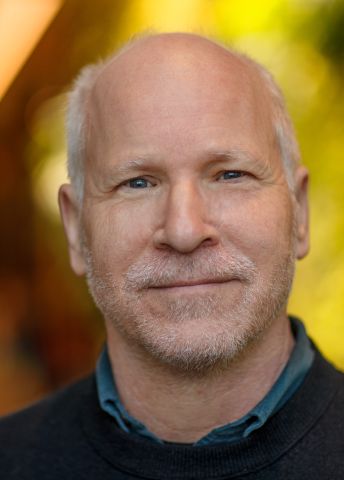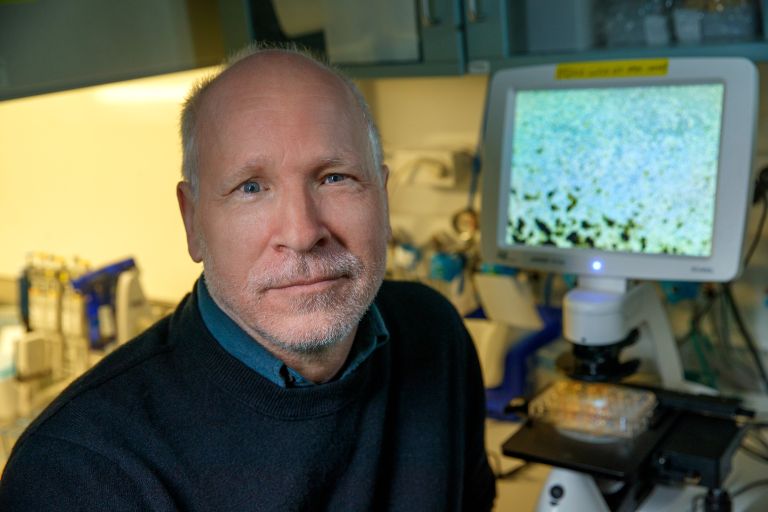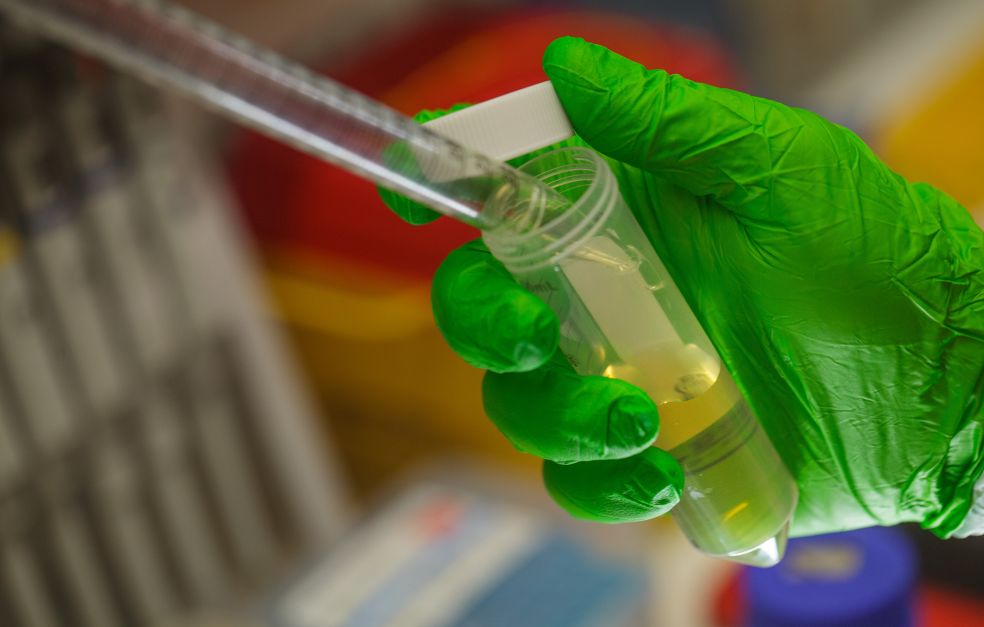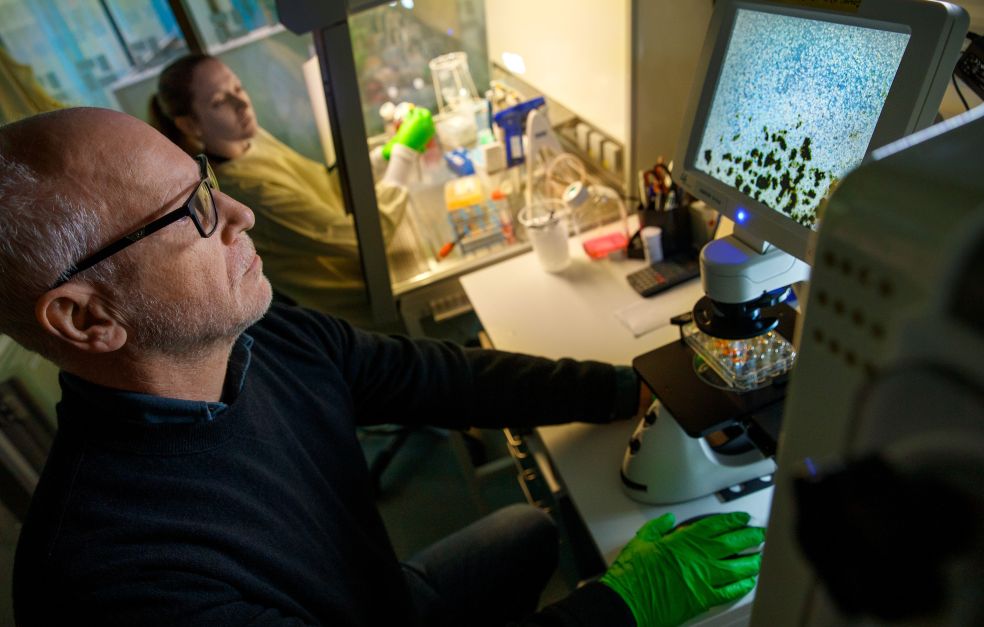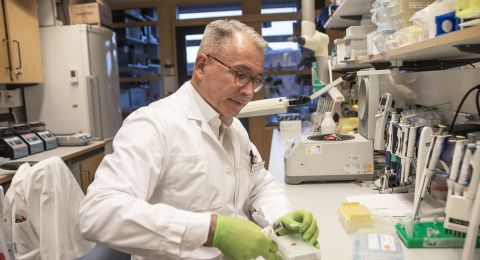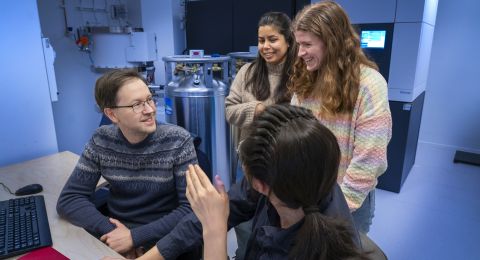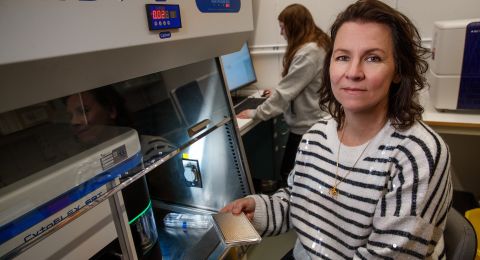When deprived of oxygen, our cells can adapt their metabolism. When they do so, various molecules are formed that were long considered insignificant. Randall S. Johnson has discovered that some of them can enhance the immune system’s memory.
Randall S. Johnson
Professor of Molecular Physiology and Pathology
Wallenberg Scholar
Institution:
Karolinska Institutet
Research field:
The body’s adaptation to oxygen availability
Our cells require oxygen to maintain their metabolism. However, oxygen availability fluctuates significantly depending on our activities and health. During intense physical activity, oxygen levels drop significantly, yet the cells must continue functioning. Oxygen regulation also plays a critical role in various diseases, such as cancer, stroke, heart attack, infection and wound healing.
It was long a mystery how cells could sense and adapt to oxygen availability. This mystery was solved in the 2000s with the discovery of a protein called HIF (hypoxia-inducible factor).
Several drugs are currently available to regulate HIF, such as those used to reduce tumor cell access to oxygen. However, Johnson, who is a Wallenberg Scholar, suggests a more refined approach.
“Inhibiting or increasing HIF has a scatter-gun effect that can lead to several undesirable results. We aim to ascertain exactly how HIF influences cellular metabolism, with the long-term goal of targeting drugs on specific parts of the process,” he says.
Impacting the immune system
In recent years Johnson and his research team have examined the metabolites resulting from altered cell metabolism during oxygen deprivation, particularly focusing on their effects on the immune system.
Only a decade ago metabolites were considered unimportant byproducts of the body’s metabolism. Since then, perceptions have shifted, and many research teams worldwide are now studying their functions.
Johnson’s research team has discovered that a specific metabolite – glutarate (or glutaric acid) – impacts a particular group of immune cells, namely T-cells.
“Glutarate is completely harmless and can be added to the food we eat, for example. Yet it has a fairly marked effect on our immune cells. We want to ascertain whether it can be used in the same way as a drug,” he says.
Enhancing memory banks
T-cells are a type of white blood cell and exist in various forms. Some activate and coordinate the immune response during illness, others kill infected or cancerous cells, and a specific group – memory T-cells – develop after an infection is fought off and help the immune system to remember what caused the illness.
“We have demonstrated that glutarate can increase the body’s memory T-cell bank. With more memory T-cells, the immune system responds faster, which is desirable in cancer treatment, for instance,” says Johnson.
The next step is to confirm the function of the metabolite using lab experiments and animal models. Meanwhile, other types of metabolites are also being studied.
The hope is to fine-tune the immune system’s response after vaccination or boost it during an ongoing infection. Since metabolites already occur naturally in the body, they could be easier to use than many other drugs.
When my field of research was awarded a Nobel Prize in 2019, I had the honor of giving the presentation and introducing the laureates. What was especially fun was that all three of them had been my friends and colleagues for a long time.
Johnson has long worked to improve our understanding of how oxygen deprivation affects the body’s cells. Among other things, he has demonstrated how immune cells adapt to survive in low-oxygen environments, such as inside cancer tumors. His research team has also discovered how a particular enzyme affects muscles during exercise.
“We observed high levels of the enzyme in muscles after exercise, initially interpreted as something that could improve training results. But we soon discovered it has the opposite effect if supplied over a longer period.”
The enzyme probably enhances muscle adaptability only during short, intense bursts. However, there is enormous interest in performance-enhancing substances, so the discovery attracted considerable attention.
The discovery of the oxygen-regulating protein HIF also drew attention, quickly leading some elite athletes to test it on themselves to see whether it could increase their blood oxygen levels.
“At that time, it had not undergone clinical testing, unlike the drugs available today. Experimenting in the way it was done back then is far from safe – it can cause strokes or heart attacks.”
Closing the circle
One reason Johnson conducts his research at Karolinska Institutet lies in another type of research – genealogy. His ancestors were among the million Swedes who emigrated in the 19th century. This fact inspired him to study Swedish literature at the University of Washington in Seattle, alongside biology. His studies culminated in an exchange year at Stockholm University to learn the language. When he received the offer of a professorship at Karolinska Institutet in 2012, he did not hesitate.
“My 89-year-old mother continues her genealogical research and recently found additional family ties traceable to Sweden. Most descendants of Swedish emigrants are now scattered across the U.S., except for me. I chose to return and close the circle.”
Text Magnus Trogen Pahlén
Translation Maxwell Arding
Photo Magnus Bergström
